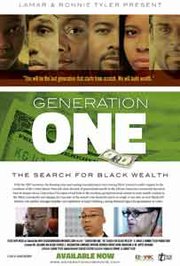Screenings for the film were sold out long ago. However, interest in “Generation One: The Search for Black Wealth,” generated the type of buzz usually reserved for an anticipated, high-budget blockbuster.
Crowds flocked to showings last month in Atlanta, Washington and Chicago.
“It’s our fifth documentary now and we felt like the next step in the progression is wealth, or more specifically, the lack of wealth in the black community and the time to release this is perfect,” said Lamar Tyler, one half of the filmmaking duo of Lamar and Ronnie Tyler.
The power couple, whom Ebony Magazine named as one of its coolest black families in America, are the creators of “Black and Married with Kids,” the largest independent African-American marriage and parenting website that boasts about 500,000 Facebook fans.
The new film presents compelling advice about the who, what and why of building financial wealth, according to the Tylers.
“We spend a trillion dollars a year and most of it goes outside of our community,” said Lamar Tyler, a former Prince George’s County resident. “We have to start supporting our own business and make sure we invest in our own community to ensure that our dollars recycle.”
The film, reviewed favorably by Black Enterprise Magazine, boldly lays out how the gaping disparity between black and white wealth came to be and then speaks to some of the black community’s most provocative, innovative problem solvers and financial experts for solutions. The result is not just a compelling discussion of the issues but an irresistible call to action and resolution— one with the potential to resonate for generations.
“With the 2007 recession, the housing crisis and soaring unemployment rates leaving black America’s wallet trapped in the crosshairs of the United States’ financial crisis, the lack of generational wealth in the African-American community has never been in sharper focus,” Tyler said.
He says the movie takes a hard look at the numbers, giving historical context to early wealth creation in the black community and tapping the expertise of the nation’s top financial experts to weigh in not only on how blacks fell behind, but surefire strategies families can implement to begin building a strong financial legacy for generations to come.
“What I found from working on the project and with different experts and talking to people in the community, is that there are a lot of issues with wealth and the problem really is an education problem,” Tyler said. “So many people watching the film told us that they didn’t know a lot of what was presented. The reason they didn’t know is that most of the time, blacks don’t have access to the information.”
Already, “Generation One” has sold out theaters in three major cities and Tyler says he’ll soon add more locations. There have been more than 123,000 likes on Facebook and 89,000 shares for the film.
“It’s important. The film is important because some of the things can be traced to mainstream culture. There is a self-centered message that’s repeatedly built into our heads,” Tyler said. “But, it’s important to know that wealth creation isn’t for you, it’s for your children, and their children, and their children. This film looks at historical reasons for why things are they way they currently stand, including that during the Great Depression, a lot of Americans had their mortgage loans forgiven but they still allowed blacks to go into foreclosure and lose their homes.”
The film is available on DVD. For more information, visit www.generation1movie.com.

